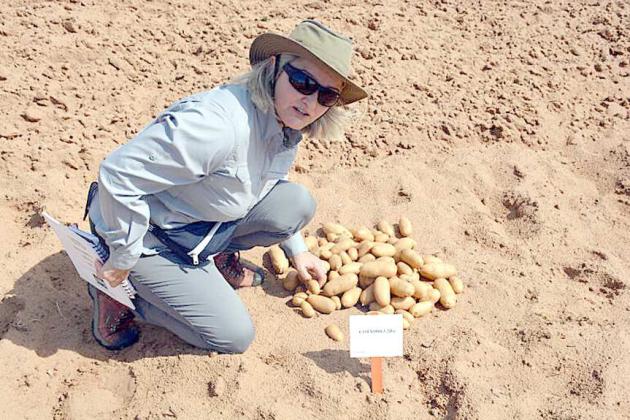Texas A&M AgriLife field day to feature 134 potato varieties
The annual Texas A&M Potato Breeding Program Field Day, hosted by Texas A&M AgriLife Research and Bruce Barrett Farms, will be July 18.
No registration is required for the free program. Participants will assemble at Springlake Potato Sales, located off of Texas Highway 385 between Littlefield and Springlake, at 10 a.m. and then go to the field, said Isabel Vales, Ph.D., AgriLife Research potato breeder in the Texas A&M Department of Horticultural Sciences within the College of Agriculture and Life Sciences, Bryan-College Station.
“We always look forward to the field day because it allows everyone involved in the industry, including researchers, commercial and seed growers, processors and retailers to discuss their experiences this season,” Vales said. “We also look forward to discussing the potatoes being released from our program.”
A potato for all reasons
This year there are 134 potato clones — russets, chippers, reds, yellows, purples, smalls and fingerlings — including Texas-released varieties, advanced selections and some advanced clones from other collaborating breeding programs.
Jeff Koym, senior research associate with AgriLife Research, Lubbock, said this growing season has had mild temperatures and more rain than average. The heat did not come on until the end of June, so that has helped the crop.
But potatoes grown in Springlake are typically prone to abiotic stresses like heat and drought that can reduce yield and quality, Vales said. Most Texasreleased varieties and advanced selections are tolerant to heat stress since they have been selected under high-temperature growing conditions.
“Recently, we have conducted studies that validate this fact,” Vales said. “Industry members nationwide and internationally are encouraged to evaluate our clones to determine if they perform well under their conditions, especially in the context of a warming climate.”
For more information, contact Vales at isabel.vales@tamu.edu, Douglas Scheuring at 979-3242564, Koym at 806-777-2412, Jeewan Pandey at 870-592-0707 or Bruce Barrett at 806-893-2040. To learn more about Texas A&M’s Potato Breeding Program, visit https://potato.tamu.edu/. ***** Kay Ledbetter is communications coordinator for Texas A&M AgriLife. Additionally, she is responsible for writing news releases and feature articles from science-based information generated by the agency across the state, as well as the associated media relations.

